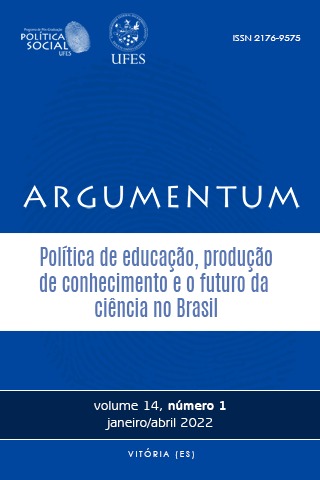The contributions of Maurício Tragtenberg: the delinquency of education in Brazil
DOI:
https://doi.org/10.47456/argumentum.v14i1.36524Abstract
This article presents the way Maurício Tragtenberg approached the relationship between power and the production of knowledge. His ideas give support to the concept of academy delinquency, which demonstrates the disconnect between means and ends within education. In other words, it is a historical reality in which all teach, and the production of knowledge does not question the for what of their activities. Consequently, they reproduce the unequal power relationships and does not consider the concrete necessities of subordinate classes in unequal and combined capitalism development. The strategies to confront these conditions are discussed from a class struggle perspective. The texts about education, written by the author during the transition to the “New Republic”, and especially the ones produced for the educational journal Educação & Sociedade, are the main sources. Accordingly, Tragtenberg’s ideas, the reality of his thoughts, are discussed to inspire the analysis of contemporary educational problems.
Downloads
Downloads
Published
How to Cite
Issue
Section
License
Copyright Transfer Agreement
As a condition for submission, the authors must agree with the Copyright Transfer Agreement, by checking the box after reading the clauses.
The author(s) (hereinafter "AUTHOR") hereby agrees to transfer, without any financial compensation, the property of copyrights regarding Argumentum, a journal of the Postgraduate Program in Social Politics (Programa de Pós-graduação em Política Social), Federal University of Espírito Santo (Universidade Federal do Espírito Santo) - Av. Fernando Ferrari, 514 - Goiabeiras 29075-910, Vitória (Brazil), (hereinafter "ARGUMENTUM"), according to the following terms and conditions:
1. I am aware of the terms of "Care Ethics Research Guide" described in the Policies section.
2. AUTHOR warrants to be the writer and copyright holder of the WORK submitted.
3. AUTHOR declares that the WORK does not infringe the rights of third-parties; that the distribution of images (if existent) was authorized; and that AUTHOR assumes total moral and property responsibility for their content.
4. AUTHOR agrees to transfer all the copyrights concerning the WORK to ARGUMENTUM, especially the rights to edit, publish, translate into another language, and reproduce it through any process or technique. ARGUMENTUM becomes the exclusive owner of the rights regarding the WORK, and any total or partial reproduction, in any other medium, printed or electronic, is strictly forbidden without prior written consent by ARGUMENTUM.
5. The copyright transfer is unpaid and, therefore, there will be no monetary compensation whatsoever by ARGUMENTUM in order to use the TEXT.

